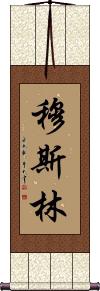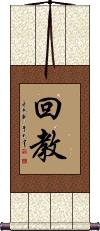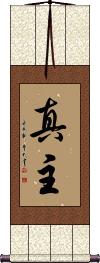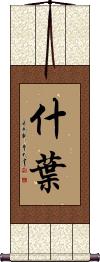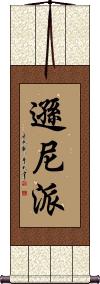Many custom options...
And formats...

Muslim in Chinese / Japanese...
Buy a Muslim calligraphy wall scroll here!
Personalize your custom “Muslim” project by clicking the button next to your favorite “Muslim” title below...
Muslim
Islam
The religion of the Hui People
回教 means “Hui Religion” in Chinese.
It refers specifically to the Hui people (Huizu), who have typical Oriental looks but are Muslim (practice the religion of Islam). Hui people can be found throughout China, often establishing Muslim neighborhoods in many cities.
My Japanese dictionary lists this as the all-Kanji way to write Islam as well.
In Korean, the first character is used as a short name to say Muslim.
Allah / God of Islam
真主 is how Chinese Muslims refer to God (it literally means “True Master”).
Oddly, in China, two different names for God have emerged. Even though Muslims, Christians, and Jews all worship the same God of Abraham.
In Arabic, the word Allah is just the Arabic way to say, God. Arab Christians pray to Allah, just like Arab Muslims. Somehow in China, the title of God diverged.
If you are curious, there are millions of Muslims throughout China but especially in the northwest portion of China known as Xinjiang. Here you will find descendants of Turkmen, Persian, Arab, and other ethnicities. Some are mixed with Han-Chinese blood; others appear to be pure Turkmen. Many have fair complexions, green eyes, and light hair but all are citizens of China. A visit to Xinjiang will shift your paradigm and blow away all of your stereotypes about what it means to be Chinese.
Shii
Movement within Islam
Shiite sect of Islam
Sunni sect of Islam
Islam
(phonetic version)
伊斯蘭教 both means and sounds like “Islam” in Mandarin Chinese.
The first three characters sound like the word “Islam,” and the last character means “religion” or “teaching.” It's the most general term for “Islam” in China. The highest concentration of Muslims in China is Xinjiang (the vast region in northwest China that was called The East Turkistan Republic until 1949 and is sometimes called Chinese Turkistan, Uyghuristan). Here you will find Uygurs, Kazakhs, Kyrgyz, and others that are descendants of Turkmen (possibly mixed with Persians and Arabs). Many of their ancestors were traders who traveled the silk road to buy and sell spices and silk and exchange other goods from the Orient and the Middle East.
I spent some time in Xinjiang and got to know this community. They are strong people who can endure much. They are friendly and love to have a good time. I was a stranger but was treated by villagers (near China's border with Afghanistan) as if I was a good friend.
However, I have heard that it's best not to cross them, as in this land, the law is the blade, and everything is “eye for an eye.” The Chinese government has little control in Xinjiang, with almost no police officers except in the capital of Urumqi (so it's a 60-hour roundtrip train ride to seek the aid of law enforcement in most cases).
While few seem devout, there are at least small mosques in every village. And you will never see a man or woman outside without a head covering.
It should be noted that these people are all citizens of China, but they are officially of the Caucasian race. A visit to Xinjiang will change your idea of what it means to be Chinese.
I've noticed you are searching for "muslim". If you are interested, I can have your favorite verse from the Qur'an translated into Chinese and written on a wall scroll for you. You can contact me siting the verse or verses you want.
Not the results for muslim that you were looking for?
Below are some entries from our dictionary that may match your muslim search...
| Characters If shown, 2nd row is Simp. Chinese |
Pronunciation Romanization |
Simple Dictionary Definition |
もろ see styles |
moro モロ |
Moro (Muslim inhabitant of the Philippines); (personal name) Moro |
侯賽因 侯赛因 see styles |
hóu sài yīn hou2 sai4 yin1 hou sai yin |
More info & calligraphy: Hussein |
穆斯林 see styles |
mù sī lín mu4 si1 lin2 mu ssu lin |
More info & calligraphy: Muslim |
亞伯 亚伯 see styles |
yà bó ya4 bo2 ya po |
Abe (short form for Abraham); Abel, a figure of Jewish, Christian and Muslim mythologies |
清真 see styles |
qīng zhēn qing1 zhen1 ch`ing chen ching chen seima / sema せいま |
Islamic; Muslim; halal (of food); clean; pure (personal name) Seima |
該隱 该隐 see styles |
gāi yǐn gai1 yin3 kai yin |
Cain (name); Cain (biblical character), a figure of Judeo-Christian-Muslim mythology |
ウンマ see styles |
unma ウンマ |
(org) Ummah; Umma; Muslim Ummah; Islamic Ummah; Islam Nation; (o) Ummah; Umma; Muslim Ummah; Islamic Ummah; Islam Nation |
ワクフ see styles |
wakufu ワクフ |
waqf (Muslim endowment) (ara:) |
回教徒 see styles |
kaikyouto / kaikyoto かいきょうと |
(See イスラム教徒) Muslim |
穆爾西 穆尔西 see styles |
mù ěr xī mu4 er3 xi1 mu erh hsi |
Morsi, Mursi or Morsy (name); Mohamed Morsi (1951-2019), Egyptian Muslim Brotherhood politician, president of Egypt 2012-2013 |
訪惠聚 访惠聚 see styles |
fǎng huì jù fang3 hui4 ju4 fang hui chü |
program of visiting Muslim households in Xinjiang to monitor them, begun in 2014 (abbr. for 訪民情、惠民生、聚民心|访民情、惠民生、聚民心[fang3 min2 qing2 , hui4 min2 sheng1 , ju4 min2 xin1]) |
阿凡提 see styles |
ā fán tí a1 fan2 ti2 a fan t`i a fan ti |
the Effendi (Nasreddin), the hero of folk tales of the Muslim world, known for his wisdom and humor |
ウラマー see styles |
uramaa / urama ウラマー |
ulama (body of authoritative Muslim scholars) (ara:); ulema |
ジンミー see styles |
jinmii / jinmi ジンミー |
dhimmi (ara:); non-Muslim citizens of an Islamic state |
タリバン see styles |
tariban タリバン |
Taliban (Afghani fundamentalist Muslim group); Taleban; (personal name) Taliban |
ハリファ see styles |
harifa ハリファ |
caliph; chief civil and religious Muslim ruler (prior to 1924); (personal name) Khalifah |
ヒジャブ see styles |
hijabu ヒジャブ |
hijab (ara:); Muslim head covering for women |
ヘジャブ see styles |
hejabu ヘジャブ |
hijab (ara:); Muslim head covering for women |
ムスリム see styles |
musurimu ムスリム |
(noun - becomes adjective with の) Muslim; Moslem |
モスリム see styles |
mosurimu モスリム |
(noun - becomes adjective with の) Muslim; Moslem |
モスレム see styles |
mosuremu モスレム |
(noun - becomes adjective with の) Muslim; Moslem |
ラマダン see styles |
ramadan ラマダン |
Ramadan (9th month of Muslim calendar) (ara:); fasting month; (personal name) Ramadhan |
伊斯蘭國 伊斯兰国 see styles |
yī sī lán guó yi1 si1 lan2 guo2 i ssu lan kuo |
Muslim countries; caliphate; Islamic State group (aka IS or ISIL or ISIS) |
羅興亞人 罗兴亚人 see styles |
luó xìng yà rén luo2 xing4 ya4 ren2 lo hsing ya jen |
Rohingya (predominantly Muslim ethnic group primarily residing in Rakhine State, Myanmar) |
イスラム圏 see styles |
isuramuken イスラムけん |
Islamic world; Muslim world |
シャハーダ see styles |
shahaada / shahada シャハーダ |
Shahada (ara: shahāda); Muslim profession of faith |
シャヒード see styles |
shahiido / shahido シャヒード |
shahid (ara: shid); shaheed; Muslim martyr |
ズィンミー see styles |
zunmii / zunmi ズィンミー |
dhimmi (ara:); non-Muslim citizens of an Islamic state |
タリバーン see styles |
taribaan / tariban タリバーン |
Taliban (Afghani fundamentalist Muslim group); Taleban; (personal name) Taliban |
ヒジャーブ see styles |
hijaabu / hijabu ヒジャーブ |
hijab (ara:); Muslim head covering for women |
Click here for more muslim results from our dictionary
The following table may be helpful for those studying Chinese or Japanese...
| Title | Characters | Romaji (Romanized Japanese) | Various forms of Romanized Chinese | |
| Muslim | 穆斯林 | mù sī lín mu4 si1 lin2 mu si lin musilin | mu ssu lin mussulin |
|
| Islam | 回教 | kai kyou / kaikyou / kai kyo | huí jiào / hui2 jiao4 / hui jiao / huijiao | hui chiao / huichiao |
| Allah God of Islam | 真主 | zhēn zhǔ / zhen1 zhu3 / zhen zhu / zhenzhu | chen chu / chenchu | |
| Shii | 什葉 什叶 | shí yè / shi2 ye4 / shi ye / shiye | shih yeh / shihyeh | |
| Shiite sect of Islam | 什葉派 什叶派 | shí yè pài shi2 ye4 pai4 shi ye pai shiyepai | shih yeh p`ai shihyehpai shih yeh pai |
|
| Sunni sect of Islam | 遜尼派 逊尼派 | xùn ní pài xun4 ni2 pai4 xun ni pai xunnipai | hsün ni p`ai hsünnipai hsün ni pai |
|
| Islam | 伊斯蘭教 伊斯兰教 | yī sī lán jiào yi1 si1 lan2 jiao4 yi si lan jiao yisilanjiao | i ssu lan chiao issulanchiao |
|
| In some entries above you will see that characters have different versions above and below a line. In these cases, the characters above the line are Traditional Chinese, while the ones below are Simplified Chinese. | ||||
Successful Chinese Character and Japanese Kanji calligraphy searches within the last few hours...
